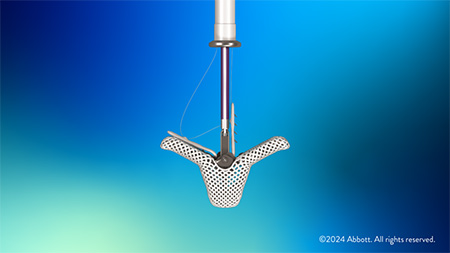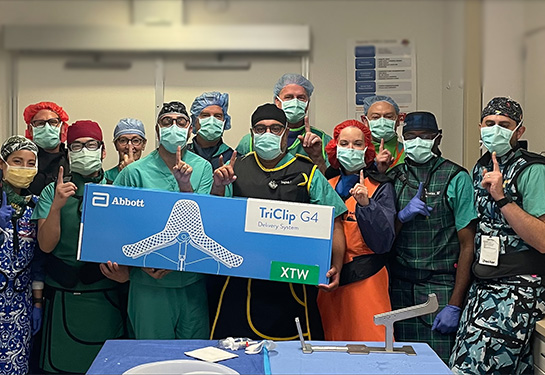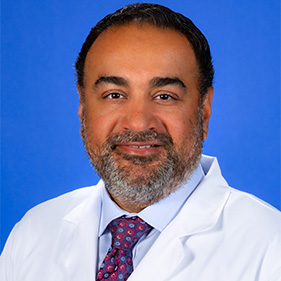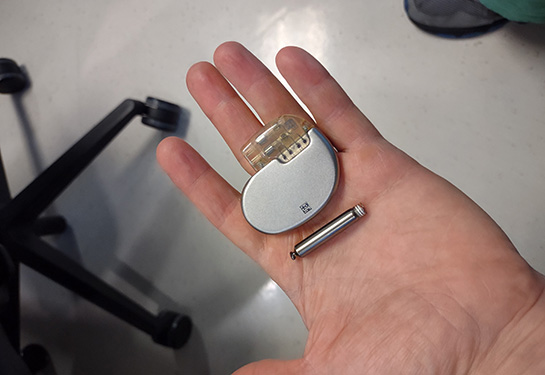Cardiology team performs novel heart valve repair with newly approved device
UC Davis is one of the first sites nationwide to treat tricuspid regurgitation using a minimally invasive catheter system
UC Davis Health cardiology team members are among the first in the country to treat patients with tricuspid regurgitation, or a leaky heart valve, by using a groundbreaking catheter.

The minimally invasive procedure, a transcatheter edge-to-edge repair (TEER), is made possible with a new medical device called the Abbott TriClip™ system.
UC Davis Medical Center is one of the first sites nationwide to have commercial access to TriClip and is the first hospital in Western United States to utilize the system since it was approved by the U.S. Food and Drug Administration (FDA) last week. UC Davis also hosted clinical trials for the procedure in 2023.
“We are excited to offer our patients this novel treatment that offers meaningful improvement in quality of life without the high procedural risk often associated with tricuspid surgery,” said Gagan D. Singh, associate professor of cardiovascular medicine and the surgeon who performed the first procedure at UC Davis Medical Center.
Tricuspid regurgitation is a condition in which the tricuspid valve of the heart fails to close completely. This can allow blood to leak backward into the atrium from the tricuspid valve, causing the patient’s heart to pump harder to move blood through the valve.
Tricuspid regurgitation affects an estimated 1.6 million Americans. Symptoms include active pulsing in the neck veins, enlarged liver, fatigue and swelling throughout the body.
Current nonsurgical treatments include diuretics (medicines that help remove excess fluid and salt) and drugs aimed at easing symptoms. Left untreated, tricuspid regurgitation can lead to atrial fibrillation, heart failure, kidney disease and even death.
“Severe tricuspid regurgitation is a debilitating condition that is associated with substantial morbidity,” said Jason H. Rogers, professor of cardiovascular medicine. “Patients with tricuspid regurgitation are extremely high risk for any type of surgical intervention, so historically they have just been monitored and treated with diuretics.”
Tricuspid transcatheter edge-to-edge repair procedure
The human heart has four valves, and if any of them leak, there is no universal way to repair them. For example, the mitral valve can be repaired with a catheter-based system. But the same catheter can’t be used on the tricuspid valve due to the valve’s location, thinness and variability.
The new system is designed specifically for the tricuspid valve’s position, location and shape. With the patient under general anesthesia, the device is delivered to the heart through a catheter, starting in the groin and guided by X-ray and ultrasound. Once in place, the clip brings together portions of the leaflets (flaps of the valve), improving the seal and reducing the leaking.
The device was tested for its safety and clinical efficacy as part of the TRILUMINATE Pivotal trial. UC Davis Health was one of the sites with the highest enrollment rates in the national trial.
“This minimally invasive approach allows the heart to pump blood more efficiently and relieve symptoms of tricuspid regurgitation,” said Rogers, who will be performing additional tricuspid TEER procedures.
Being one of the first centers in the country to offer commercial availability of the TriClip system is a true honor and a testament to the outstanding team-based approach to patient care at UC Davis Health.”—Gagan D. Singh
A leader in transcatheter edge-to-edge repair
UC Davis Health has been a leader in transcatheter edge-to-edge repair for nearly two decades. In addition to the transcatheter tricuspid valve repair procedure, the medical center’s cardiac services offer several minimally invasive catheter-based mitral valve procedures.
“Being one of the first centers in the country to offer commercial availability of the TriClip system is a true honor and a testament to the outstanding team-based approach to patient care at UC Davis Health,” added Singh. “The UC Davis Structural Heart Team is among the best and most comprehensive in the nation. Our mission of providing complete, efficient and high-quality care to the patients we care for is what drives us to lead the field.”





